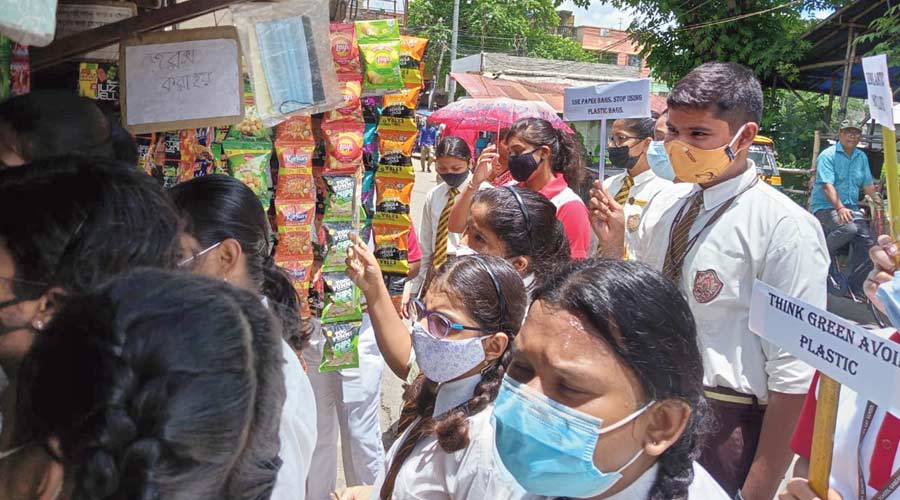A group of school students faced resistance from shopkeepers when they visited a vegetable and fish market to explain to the traders the ill-effects of plastic and urge them to not use plastic bags less than 75 micron in thickness.
Several students said they were “taken aback” by what they saw and heard.
Some shopkeepers blamed the higher price of thicker plastic or other bags for their reluctance to switch.
Customers on most occasions do not carry a bag and force shopkeepers to give them one for free, a trader told a student.
“The same customer who would pay Rs 10 to buy a bag at a mall would demand it for free from us,” a student quoted a grocer as saying.
The students of Julien Day School Ganganagar, on the northern fringes of the city, spent about an hour talking to shopkeepers in the local market. The interaction brought to light why it can be difficult to implement the ban on plastic bags less than 75 micron thick.
The Union ministry of environment, forest and climate change has notified a set of plastic waste management rules, whereby the manufacture, import, stock, distribution, sale and use of plastic bags less than 75 micron in thickness have been banned.
“At the first shop we visited, the shopkeeper was arrogant and shouted back at us that they know the rules and we need not cite them,” said Debasmita Ghosh, a Class XI student.
“If they don't have the kind of bags they are supposed to use, they would stick to the dangerous single-use plastic. That is what needs to stop.”
Students of classes VIII to XII, accompanied by their teachers, went to the market near their school and spent about an hour talking to fish and vegetable sellers.
The students displayed placards and posters and approached sellers to enlighten them on the harmful impact of single-use plastic bags.
“The students did face resistance from shopkeepers, some of whom are reluctant to use thick plastic or cloth bags reportedly because of the price. But despite that, such campaigns have to be consistent and only then there could be a gradual change,” said Bobby Baxter, principal of the school.
A local supplier of plastic bags said an 11 inchX14 inch bag less than 75 micron in thickness costs around 75 paise. A bag of the same size but of 75 micron thickness costs around Rs 2.
A cheaper cloth variety costs around Rs 1.50, he said.
“A packet contains around 225 plastic bags less than 75 micron thick. As for bags 75 micron in thickness, a packet contains only about 85. Currently, because of the ban, shopkeepers are ordering the thicker variety more,” said a trader who supplies plastic bags to markets in Madhyamgram on the city’s northern outskirts.
The students carried with them plastic and cloth bags to show what the sellers should use.
Buyers said only a persistent crackdown could lead to proper implementation of the ban.
“I had to go to a mall while returning from work and I was forced to buy a bag that cost Rs 14. That was a lesson for me. Next time I would be careful and carry a bag. But when I go to a local market, I know I can force a trader from whom I have bought things to hand me a plastic bag for free,” said Sunita Neupane, who lives in Ramakrishna Pally in Ganganagar.
“The shopkeepers alone are not at fault. Customers need to carry bags when they visit markets. We also need to speak to our parents about it,” said Pratiksha Maity, a Class XII student.
